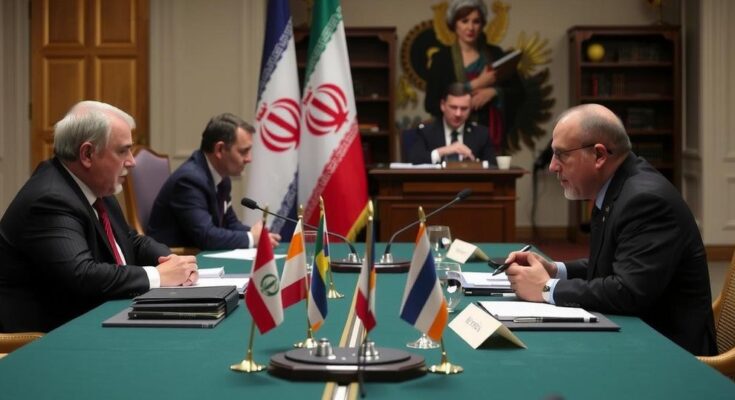Iran’s Foreign Minister, Abbas Araghchi, indicated that European powers are serious about resuming nuclear talks after recent discussions in Geneva. The conversations, which involved the E3 nations, focused on lifting sanctions and finding diplomatic solutions. While the talks signal progress, uncertainties loom regarding the new U.S. administration’s stance toward negotiations.
On Tuesday, Abbas Araghchi, Iran’s Foreign Minister, remarked that European nations indicated a serious intent to resume nuclear negotiations following discussions held in Geneva. Araghchi stated, “The talks with the three European countries are aimed at exploring how we can return to the nuclear negotiations,” emphasizing that discussions were both positive and constructive. Despite the encouraging tone from European officials, he expressed uncertainty regarding the new U.S. administration’s interest in continuing negotiations.
Iranian officials engaged in talks with representatives from Britain, France, and Germany, collectively referred to as the E3. These discussions focused on key issues, including the lifting of sanctions. European Union diplomat Enrique Mora described his meeting with Iranian officials as constructive, aiming toward achieving a diplomatic resolution concerning the nuclear matter. This round of talks follows a previous meeting held in Geneva in November, underscoring a renewed diplomatic effort at a pivotal time, particularly with the imminent inauguration of President-elect Donald Trump, who previously enforced stringent sanctions on Iran.
The backdrop of these discussions is rooted in the 2015 nuclear agreement that resulted in a reduction of international sanctions on Iran in exchange for restrictions on its nuclear activities. However, the United States’ unilateral withdrawal from this accord in 2018 marked a significant turning point, prompting Iran to gradually roll back its commitments under the agreement. Iran has consistently expressed its willingness to revive the nuclear deal with the international community.
The discussions between Iran and the E3 powers come after a prolonged period of heightened tensions following the U.S. withdrawal from the 2015 nuclear agreement, officially known as the Joint Comprehensive Plan of Action (JCPOA). This historic agreement aimed to limit Iran’s nuclear capabilities in exchange for sanctions relief. After the U.S. reimposed sanctions, Iran began to roll back its compliance with the accord. The engagement with European powers seeks to navigate the complexities arising from the strained relations and to foster diplomatic dialogue towards a resolution. Given the potential shifts in U.S. foreign policy under the incoming presidential administration, these talks are critical for the future of nuclear negotiations.
In summary, the recent discussions between Iran and European powers signal a potential opening for renewed nuclear negotiations after significant tensions resulting from the U.S. withdrawal from the 2015 agreement. Both sides have expressed a commitment to exploring diplomatic avenues, though uncertainties remain regarding the position of the new U.S. administration. The outcome of these negotiations could greatly influence the geopolitical landscape surrounding Iran’s nuclear program and international relations.
Original Source: www.barrons.com




